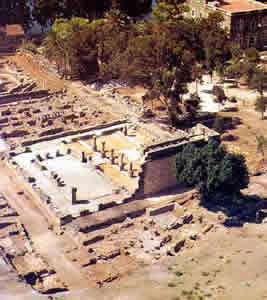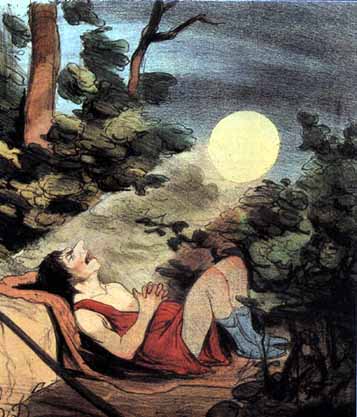Where Grace Reigns
October 4, 2006
Rev. Matthew Winzer (armourbearer on the Puritanboard on this thread) made the following statement (emphasis mine)
…in reformed churches, where free grace is proclaimed loud and clear, blessings joined to obedience should never be called law-preaching. I tend to think it is only a soul stricken by the law that could construe it that way; where grace reigns every precept is a precious promise of God’s goodness to His people.
A Good Quote For When You Feel Guilty About Being Lazy
October 3, 2006
…not that that ever happens to me, of course.
Thomas Decker, quoted in Dorothy Sayer’s “Gaudy Night”
Do but consider what an excellent thing sleep is: it is so inestimable a jewel that, if a tyrant would give his crown for an hour’s slumber, it cannot be bought: of so beautiful a shape is it, that though a man lie with an Empress, his heart cannot beat quiet till he leaves her embracements to be at rest with the other: yea, so greatly indebted are we to this kinsman of death, that we owe the better tributary, half of our life to him: and there is good cause why we should do so: for sleep is that golden chain that ties health and our bodies together. Who complains of want? of wounds? of cares? of great men’s oppressions? of captivity? while he sleepeth? Beggars in their beds take as much pleasure as kings: can we therefore surfeit on this delicate Ambrosia? Can we drink too much of that whereof to taste too little tumbles us into a churchyard, and to use it but indifferently throws us into Bedlam? No, no, look upon Endymion, the moon’s minion, who slept three score and fifteen years, and was not a hair the worse for it.
What Does the Devil Think about Jesus?
October 2, 2006
G. Campbell Morgan, The Crises of the Christ, Part Three — The Temptation, Conclusion
In the last temptation there is an intimation of the devil’s estimate of the worth of Jesus. After showing Him the kingdoms of the world and the glory of them, he declared his conviction that to capture the soul of Christ would be a greater victory than all his conquests. He reckoned this perfect Man to be worth all over which he claimed to have gained authority. “All these,” said the enemy, and the offer included the result of the dreadful persistency of diabolical endeavour through long centuries, the evolution of evil through tedious processes. The spotless Son of God was, in the estimate of the devil, of more value than all. In effect the enemy said, I will give to Thee all that has cost so much, if I may but gain for one moment Thy homage. It is a stupendous and startling revelation, the devil’s estimate of the worth of Christ. There are persons who say that they cannot understand the expiatory work of Christ on the Cross, because of the difficulty of believing that the suffering and death of One could possible be sufficient for the redemption of the world. Those who speak of this difficulty evidently hold Christ at lower valuation than did the devil. He, comparing the world with the Master, tacitly acknowledged the greater worth of Jesus. Satan evidently reckoned that unless he could bring Christ into subjection, nothing he had, would he be able to hold. He evidently recognised the infinite value of this second man; and understood, moreover, the relation of that undepreciated value to the redemption of the world.
The Arrangement of Matthew
September 29, 2006
Augustine: Are Unbelievers United to Christ?
September 29, 2006
On the internal/external covenant membership distinction: De Doctrina Christiana, book 3, ch. 32
THE SECOND RULE OF TICHONIUS
The second rule is about the twofold division of the body of the Lord; but this indeed is not a suitable name, for that is really no part of the body of Christ which will not be with Him in eternity. We ought, therefore, to say that the rule is about the true and the mixed body of the Lord, or the true and the counterfeit, or some such name; because, not to speak of eternity, hypocrites cannot even now be said to be in Him, although they seem to be in His Church. And hence this rule might be designated thus: Concerning the mixed Church. Now this rule requires the reader to be on his guard when Scripture, although it has now come to address or speak of a different set of persons, seems to be addressing or speaking of the same persons as before, just as if both sets constituted one body in consequence of their being for the time united in a common participation of the sacraments.
The Problem of Loose OT Quotations in the NT
September 27, 2006
Alfred Edersheim, The Life and Times of Jesus the Messiah, p.308 (Hendrickson:1993)
[Of the reading of the Scriptures in the synagogue] 
As the Hebrew was not generally understood, the Methurgeman, or Interpreter, stood by the side of the reader (comp. 1 Cor. 14:27,28), and translated into the Aramaean verse by verse, and in the section from the Prophets, or Haphtarah, after every three verses (Megill. 24a). But the Methurgeman was not allowed to read his translation, lest it might popularly be regarded as authoritative. This may help to us in some measure to understand the popular mode of Old Testament quotations in the New Testament. So long as the substance of a text was given correctly, the Methurgeman might paraphrase for better popular understanding. Again, it is but natural to suppose, that the Methurgeman would prepare himself for his work by such materials as he would find to hand, among which, of course, the translation of the Septuagint would hold a prominent place. This may in part account alike for the employment of the Septuagint, and for its Targumic modifications, in the New Testament quotations.
Some Good Points from the Apocrypha
September 22, 2006
Sirach 27:4-7 & 28:8-12
“When a sieve is shaken, the refuse remains; so a man’s filth remains in his thoughts. The kiln tests the potter’s vessels; so the test of a man is in his reasoning. The fruit discloses the cultivation of a tree; so the expression of a thought discloses the cultivation of a man’s mind. Do not praise a man before you hear him reason, for this is the test of men.”
“Refrain from strife, and you will lessen sins; for a man given to anger will kindle strife, and a sinful man will disturb friends and inject enmity among those who are at peace. In proportion to the fuel for the fire, so will be the burning, and in proportion to the obstinacy of strife will be the burning; in proportion to the strength of the man will be his anger, and in proportion to his wealth he will heighten his wrath. A hasty quarrel kindles fire, and urgent strife sheds blood. If you blow on a spark, it will glow; if you spit on it, it will be put out; and both come out of your mouth.”
Which serves as a reminder that the Apocrypha are not evil. The problem is not that they are singularly bad books; the problem is that they are illegitimately elevated to the level of Scripture. That does not mean they are not very good to read.
The Lord is Risen and Glorified
September 17, 2006
And Leo the Great
has some glorious words to point out the implications of that, in his first sermon “On The Lord’s Ascension”.
And in the course of these and other miracles, when the disciples were harassed by bewildering thoughts, and the Lord had appeared in their midst and said, “Peace be unto you,” that what was passing through their hearts might not be their fixed opinion (for they thought they saw a spirit not flesh), He refutes their thoughts so discordant with the Truth, offers to the doubters’ eyes the marks of the cross that remained in His hands and feet, and invites them to handle Him with careful scrutiny, because the traces of the nails and spear had been retained to heal the wounds of unbelieving hearts, so that not with wavering faith, but with most steadfast knowledge they might comprehend that the Nature which had been lain in the sepulcher was to sit on God the Father’s throne. (…) And hence the most blessed Apostles and all the disciples, who had been both bewildered at His death on the cross and backward in believing His Resurrection, were so strengthened by the clearness of the truth that when the Lord entered the heights of heaven, not only were they affected with no sadness, but were even filled with great joy. And truly great and unspeakable was their cause for joy, when in the sight of the holy multitude, above the dignity of all heavenly creatures, the Nature of mankind went up, to pass above the angels’ ranks and to rise beyond the archangels’ heights, and to have Its uplifting limited by no elevation until, received to sit with the Eternal Father, It should be associated on the throne with His glory, to Whose Nature It was united in the Son. Since then Christ’s Ascension is our uplifting, and the hope of the Body is raised, whither the glory of the Head has gone before, let us exult, dearly-beloved, with worthy joy and delight in the loyal paying of thanks. For to-day not only are we confirmed as possessors of paradise, but have also in Christ penetrated the heights of heaven, and have gained still greater things through Christ’s unspeakable grace than we had lost through the devil’s malice. For us, whom our virulent enemy had driven out from the bliss of our first abode, the Son of God has made members of Himself and placed at the right hand of the Father, with Whom He lives and reigns in the unity of the Holy Spirit, God for ever and ever. Amen.
Calvin on Ingratitude
September 15, 2006
…ingratitude is like an abyss which absorbs all the fullness of God’s blessings.
–John Calvin, Commentary on Lamentations (1:7)
Helping us see better by using a dark curtain
September 13, 2006
John Calvin, Sermons on the Deity of Christ, Sermon 1
[Speaking of those who found support for the doctrine of the Trinity in the writings of pagan philosophers]
Now those who are so curious as to wish thus to make the Philosophers agree with Holy Scripture think they do great service to the Christian Church when they can say that the Gospel-writers have not been the only ones who have spoken thus and that even the pagans have well known such things. It is very apropos! As though one put a veil before clear vision. Behold God Who makes Himself clear to us by the doctrine of His Gospel, and we are going to put a veil before it by saying, “Look at this! Your clearness will be still more clear.”
It is very certain that God willed that these same things might be known by pagan Philosophers to render them so much more inexcusable before His Majesty. But that is not to say that His doctrine ought to be confirmed by what they have said. For the fact is that, although the more they thought they were approaching God, the further away they were straying. So is fulfilled this sentence which Saint Paul pronounces against all mankind. All those who wished to be too clever, who did not seek God in such reverence and humility as they ought, have fallen into the depth of error. And it is a just punishment from God if we come thus to pollute His doctrine, classing it among the foolish inventions of men.





